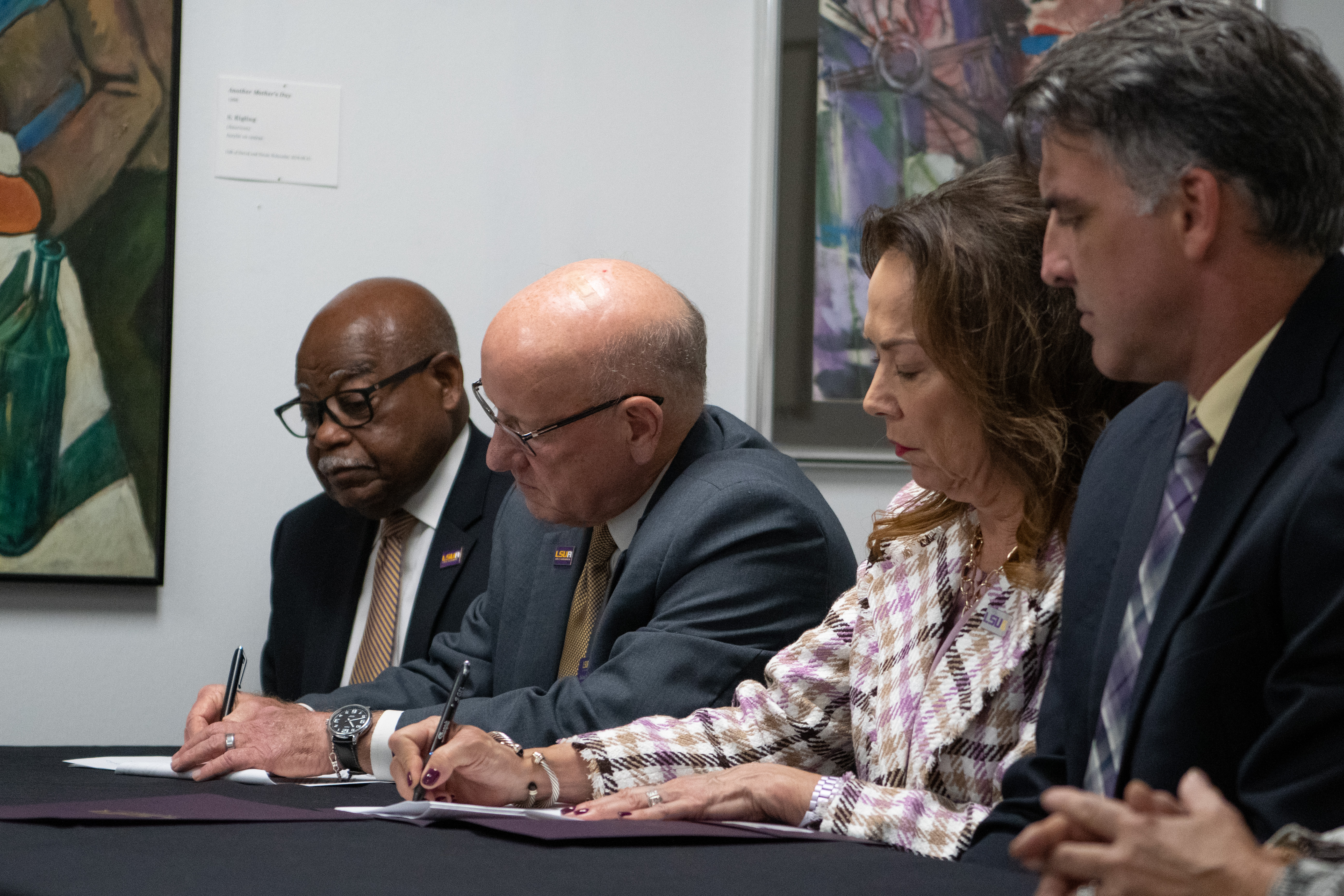Frequently Asked Questions
PM-73 is a policy that Louisiana State University System implemented to outline the University’s process as it relates to investigating complaints of sexual misconduct and Title IX. The federal government mandates all federally funded institutions to create and abide by such policies.
Title IX is a federal law that mandates “no person in the United States shall, on the basis of sex, be excluded from participation in, be denied the benefits of, or be subjected to discrimination under any education program or activity receiving Federal financial assistance.” Colleges and universities receiving Federal financial assistance must guarantee ALL students an education and learning environment free from sex discrimination and sexual misconduct. They must also guarantee ALL employees a safe and welcoming work environment free from sex discrimination and sexual misconduct.
Sexual misconduct is any sexual act or contact of sexual nature that occurs without consent of the other person or persons regardless of personal relationship. Sexual misconduct
can be a range of behaviors including forms of dating/domestic violence, sex discrimination,
sexual assault, sexual harassment, stalking, and any other conduct of a sexual nature
that has the purpose or effect of threatening, intimidating, or coercing a person.
Consent is the affirmative and voluntary agreement to engage in a specific sexual
activity during a sexual encounter. It cannot be obtained by threat, coercion, or
force. It also cannot be obtained from someone who is sleeping, or otherwise mentally
or physically incapacitated, whether due to alcohol, drugs, or some other reason.
Louisiana State University is responsible for investigating complaints promptly and equitably; stopping inappropriate behavior; seeking remedies to the behavior; and preventing it from occurring in the future. In each step of the complaint process, the parties involved are notified of their rights and/or options, trained university officials handle information, and procedures are followed in a timely manner. Interim measures, such as separating the parties, suspensions, alternative scheduling, and/or housing arrangements may be recommended.
Complainants have a right to be informed of their options; to notify law enforcement; to be notified of counseling
services; to be notified of options for changing academic and/or living situations;
to have the opportunity to have an advisor of choice present during any disciplinary
proceeding; and to be informed of the outcome of any disciplinary proceeding.
All parties involved in a complaint, investigation, and/or resolution, including witnesses,
shall keep information concerning the complaint private and shall be notified of this
obligation. However, LSU may be required to divulge information on a need-to-know
basis in order to properly address the complaint. Violations of confidentiality may
result in disciplinary or other action.
A student or employee has the right to have an “Advisor of Choice” present during any meeting conducted under this policy. The “Advisor of Choice” can be any person who the student or employee chooses but may not have personal involvement regarding any facts or circumstances of the alleged misconduct. The Advisor’s only function shall be to assist and/or consult with the student or employee. This Advisor may be an attorney, but participation shall be limited as stated above. The “Advisor of Choice” may not act as a spokesperson.
LSU maintains jurisdiction over PM-73 cases even when misconduct occurs outside the
boundaries of campus. Depending upon the circumstance, LSU may be required to investigate
an off-campus incident. Jurisdiction is evaluated on a case-by-case basis. LSU may
extend jurisdiction (over off-campus conduct) if the alleged conduct by the student
or employee involved violence or produced a reasonable fear of physical harm; and/or
involved any other members of the LSU community or any academic work, records, documents,
or property of LSU.
Here is a link to LSU’s PM-73 policy: https://www.lsu.edu/administration/policies/pmfiles/PM73-Title-IX-and-Sexual-Misconduct-Policy.pdf. In the link, you will find the full policy, which goes into more detail and houses
all the necessary definitions one may need when addressing an alleged violation of
the policy LSU PM-73.
Yes, PM-73 applies to all LSU campuses and their affiliates.
The complainant always retains control over what level of information to share with involved parties. When a report of sexual misconduct is shared with the Title IX Coordinator, or any other responsible party, the University has a legal duty to follow up on the report to determine the appropriate response under this policy. A Title IX Investigator will conduct an initial assessment regarding, among other things, the nature of the report, the safety of the individual and the broader campus community, and the complainant’s expressed preference for resolution. Students and/or employees are not pressured to pursue a specific action. In planning any response, the wishes of the reporting party are given full consideration. Nevertheless, the University may need to pursue a certain path despite the wishes of the student, but usually only if there is a broader safety risk for the community.
Reporting an incident to the police and/or pursuing criminal charges are always available
to a student and/or employee and the University will help in accessing those resources,
but it is separate and different from the University’s Title IX process. A complainant
can pursue both the criminal and administrative process at the same time.
The Title IX team intentionally works to create a compassionate, sensitive environment to address all concerns; offer an unbiased and transparent system for gathering facts; and connect all community members with appropriate support and resources.
PM-73 requires most employees to report, but not all. Some employees have legally
recognized confidentiality protections and will not share information without the
consent of the victim/survivor.
Yes, if a student reports sexual misconduct/harassment by an employee, LSU must take
action. Based on the report, LSU will notify the student of options and resources
available for support. LSU will also notify the employee of the allegation, and in
most instances will conduct an investigation. If it is found that the employee has
engaged in sexual misconduct/harassment, LSU will take steps to ensure the conduct
stops.
There is no time limit for making a report. The University encourages reporting an incident as soon as possible in order to maximize their ability to respond promptly and effectively. The University does not, however, limit the time frame for reporting. However, the longer an incident goes without being reported, the less successful the investigation will be. If the respondent is no longer a student or employee, the University may not be able to take action against the Respondent, but it will still seek to meet its obligation under PM-73 by taking steps to end the harassment, prevent its recurrence, and address its effects, when appropriate.
Mandatory reporters are faculty and staff that have supervisory responsibilities as well as staff who manage academic or student programs. Mandatory reporters must report Title IX complaints to the Title IX Coordinator or one of the Deputy Coordinators. If an employee who is not obligated mandatory reporter receives a Title IX complaint, they are encouraged to report it to the Title IX Coordinator, a Human Resources Officer or to their supervisor.
When a report of sexual misconduct/harassment is made to the Title IX Coordinator or an mandatory reporter (e.g. supervisor, manager, HR professional), LSU has a legal duty to follow up on the report to determine whether sexual misconduct occurred and if so, to take appropriate action to ensure that the sexual misconduct/harassment ends. A Title IX Investigator will conduct an initial assessment regarding, among other things, the nature of the report, the safety of the individual and of the broader campus community, and the complainant’s expressed preference for resolution. While an employee may request confidentiality and LSU will weigh the request with LSU’s obligation to provide a safe, non-discriminatory environment, in some instances it may not be possible to provide complete confidentiality to the employee.
If an employee reports the incident to a confidential source, the confidential source will advise the employee of their options. A mandatory reporter such as a Human Resources Officer must report and take action if an employee discloses they have been sexually harassed.
Interim measures may be taken while an investigation is pending to ensure that no
sexual misconduct/ harassment continues while the investigation is ongoing. If an
investigation results in a finding of sexual misconduct, LSU will work with the Department
and the individuals to come up with potential accommodations to ensure that the sexual
misconduct/harassment does not reoccur. In some cases temporary no contact orders,
schedule changes or space changes may be an option. Other types of accommodations
may be considered depending on the circumstances of the situation.
You can contact your LSU Human Resources Officer or you may also contact LSU’s Title
IX Coordinator for help. In addition, please review the resources page for additional
support.
Retaliation against an employee or student for filing a complaint, or who are involved in a complaint, in good faith is prohibited. Any acts of reprisal, intimidation, discrimination or harassment for coming forward with a complaint could be considered retaliation. If you believe that retaliation may have occurred, you should report your concern immediately to your supervisor, your Human Resources Officer or the Title IX Coordinator.
First listen without judgment, offer support and connect the individual with resources such as LSU Student Health Center for students and HRM for employees. You and/or the complainant are encouraged to report the complaint to the Title IX Coordinator, a Deputy Title IX Coordinator, Human Resources or your supervisor.
If you are a witness to inappropriate behavior, determine whether you can intervene and speak up. If it is not appropriate or safe for you to do so, you should report what you witnessed to your supervisor or a Human Resources employee.
It may be helpful to speak with an advisor or your supervisor. If you realize you
may have behaved inappropriately, it may be appropriate to apologize for your actions.
Cooperate fully with any investigation and provide the investigator with any information
that you believe is relevant to a determination and/or resolution of the complaint.
University Title IX investigators will be assigned to investigate any PM-73 complaints. These University representatives are trained to be able to investigate sensitive matters such as these.
When it is someone’s word against another person’s word, then this is where witnesses or any other relevant pieces of information or evidence to the case should be presented to the Title IX investigators. Any additional information you can provide to the Title IX investigators will be beneficial for you to help relay your version of events.
Either party may appeal the findings of the formal resolution process in accordance with existing University policies detailing appeal procedures for students or for employees. Appeals must be submitted in writing to the Campus Title IX Coordinator or designee within ten (10) business days upon receipt of the outcome.




